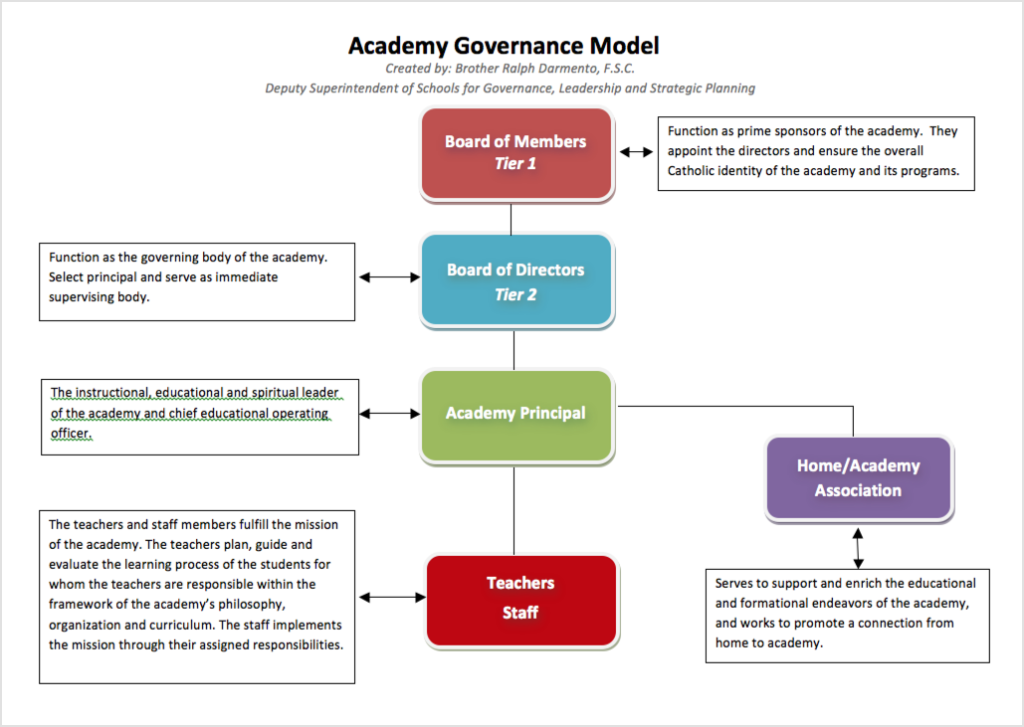By Brother Ralph Darmento, F.S.C.
The 2014-2015 academic year marks the beginning of the sixth year for the implementation of Preserving the Vision, the strategic planning process for Catholic education within the diocese.
This new year will see 42 Catholic academies thriving under the two-tier governance model composed of a Board of Members (Moderator of the Curia, Superintendent of Schools, aligned pastors) and a Board of Directors. The directors, men and women of varied backgrounds, bring their particular expertise, interest and commitment to Catholic education to this most important ministry of leadership and service. The experience of pastors, principals, parents and directors indicates the importance of the collaboration between and among the clergy and interested laity who serve as directors.
Brother David Caretti, F.S.C., (2013) found that “governance relationships require the involved parties to know one another’s roles, to be engaged within their appropriate roles, and to actively collaborate within the governing responsibility.”
To ensure the success of this governance paradigm, emphasis has been placed on the orientation and continuing formation of the directors. Professional development programs have been designed to equip directors with the necessary background and tools to perform their roles and responsibilities with competence and vision, in accord with the mission and ministry of Catholic education leadership.
In addition, four board mentors have been employed to guide the boards in functioning in accord with the structure of the academy governance model.
One of the priorities of Preserving the Vision is to transition the remaining 42 parish schools to the academy model by 2017. These schools are preparing for the transition through their own advisory boards and through assuring the readiness of the school through participation in a facilities audit, the responsible stewardship of financial resources and engaging in appropriate planning such as the recruitment of directors.
As the academies mature, they are assuming responsibility for strategic planning and incorporating new educational programs and paradigms to increase student achievement.
At this writing, enrollment in the academies has been stable with many experiencing growth; 14 have been approved for Universal Pre-Kindergarten programs, and many have elected to participate in special programs such as the Performing Arts Residency, the Aquinas Program for the gifted and talented and the Renzulli Program for differentiated learning. Principals have opined that they “appreciate the opportunity to focus on the education and formation of the students and much less on administrative trivia.”
Arlene Barcia, principal of Our Lady of Trust Catholic Academy, offers the observation that she “spends the majority of her time observing the dynamic interaction of students and teachers in the classrooms.”
Michael LaForgia, principal of Divine Wisdom Catholic Academy, remarks that “together with my associate principals and teachers we are delving into the Common Core, essential questions and unit planning and focusing on ways to increase student achievement as the result of an emphasis on the teaching/learning process.”
Chait, Ryan and Taylor (2005) found that board excellence is a result of directors “discerning, defining, deliberating and deciding issues of consequence.” Board chairs agree with this research finding and add their own insights.
Michael Long, chair of the board of Holy Angels Catholic Academy, appreciates “the opportunity to think independently and to govern collectively.”
Regina Moreno, chair of the board at Our Lady of Lourdes Catholic Academy, prizes the emphasis of the board on “demonstrating allegiance to the mission of the academy.” She believes that “all decisions and deliberations are guided by faithfulness to the academy’s core values, Catholic culture and mission.”
While challenges remain, such as the recruitment of directors, together and by association, the Catholic community is gradually accepting the changing face of governance in Catholic education.
Brother Ralph Darmento is Deputy Superintendent of Schools for Governance, Leadership and Strategic Planning.
Editor’s Note: For more information, see below chart depicting the Academy Governance Model (click to enlarge image).

